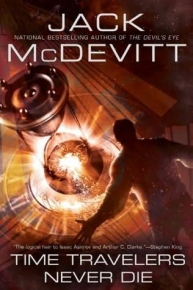

TIME TRAVELERS NEVER DIEby Jack McDevittAce978-0-4411-01763-8384pp/$24.95/November 2009 |
 |
Reviewed by Steven H Silver
Time Travelers Never Die is based on Jack McDevitt s 1996 short story of the same title. Although many of the characters names are the same, as well as the overall concept, the details differ in ways that mean that the novel is not simply an expansion of the story, but rather a reworking of it, although not necessarily a required re-working.
Following the disappearance of physicist Michael Shelbourne, his son, Adrian (called Shel), is summoned to his father s attorney s office. There, Shel receives some strange devices his father left him. His experimentation with one of them leads him to realize that his father had created a device that allows for time travel, and that his father s disappearance may not have been sinister. Although his father specifically asked him to keep the devices secret, Shel confides in his long-time friend, classical language professor Dave Dryden, whose assistance he decides he needs in order to travel through the ages to find his wayward father.
Shel and Dryden begin looking in a variety of times and places Shel's father might be expected to travel to. Although their quest is unsuccessful, they both develop a taste for the ultimate in destination travel, visiting a variety of times, places, and people. McDevitt clearly enjoys placing his characters in proximity to characters as varied as Galileo and Sojourner Truth. While most of these interactions are brief, merely Shel and Dryden rubbing shoulders with them, in a few cases, most notably Aristarchus, one of the librarians of Alexandria, they develop a relationship.
McDevitt's characters are careful about creating potential paradoxes, especially after Shel's father's warning that potential paradoxes can cause the universe to self-correct by instigating heart attacks or other fatal accidents, but they do take advantage of their ability to time travel. More importantly for the novel, McDevitt has looked at the consequences of having the ability to travel in time in ways that are often overlooked by science fiction authors. The title of the novel is indicative that as long as Shel and Dryden have the ability to time travel, they can always find a time when anyone they want to talk to is alive, including themselves, although meeting themselves would appear to posit a paradox.
The real trouble begins when Shel travels to the future and discovers his own death in a house fire. Avoiding paradox is one thing, but Shel sets out to avoid his faith by avoiding the time when he was killed. With Shel missing, Dryden turns his attention from chronotourism to trying to figure out where and when his friend is. This is made more difficult because not only does Shel not wish to be found, but because Dryden's equipment, which he and Shel only inherited and don't fully understand, is not always the most reliable.
As with most of McDevitt's novels, Time Travelers Never Die contains plenty of interesting concepts. However, there is only limited conflict and tension in the novel, which means the reader can feel like they are seeing the cool things that McDevitt includes, but there is never a sense of danger or mystery to fully pull the reader into the world and times that Dryden and Shel are exploring. While Time Travelers Never Die may not be McDevitt's most challenging work, it provides an entertaining romp through the history of the world.
